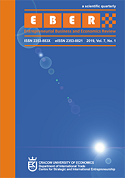Formal and Informal Knowledge Sharing in Organisations from Slovakia and Hungary
Formal and Informal Knowledge Sharing in Organisations from Slovakia and Hungary
Author(s): Andrea Bencsik, Tímea Juhász, Ladislav Mura, Agnes CsanádiSubject(s): Human Resources in Economy
Published by: Uniwersytet Ekonomiczny w Krakowie
Keywords: consequences of gossip at workplaces; gossip; informal knowledge; knowledge management; knowledge sharing;
Summary/Abstract: Objective: The purpose of the research is to investigate whether leaders deal with the impact of informal knowledge sharing (workplace gossip) on organisational performance or not. Research Design & Methods: A quantitative survey (questionnaire survey) was conducted and SPSS was applied to evaluate the research results. The next phase of the research focused on preparing case studies, with a specific aim to identify the role and impact of workplace gossip. Findings: The research results show that workplace gossip (informal knowledge sharing) has a significant impact on work, but the consequences of gossip are not addressed efficiently in theory and practice. Organisations recognize the need for knowledge management on a strategic level and they use the appropriate tools, but the gossip as an informal communication method is not accepted. Businesses are not concerned with the consequences of gossip; they never try to quantify its economic impacts. Implications & Recommendations: Gossip is an essential part of the culture worldwide, even if the manifestation of it is different. The opposite result is achieved if workplace gossip is prohibited or punished by the management. The goal is to achieve positive benefits that will be visible when the economic impact of gossiping can be confirmed. Contribution & Value Added: There is a lack of scientific work addressing the economic consequences of gossip in different situations in organisations. The economic effects of gossip can be calculated not only in KMSs, but might be applied for other processes in the organisation.
Journal: Entrepreneurial Business and Economics Review
- Issue Year: 7/2019
- Issue No: 3
- Page Range: 25-42
- Page Count: 18
- Language: English

